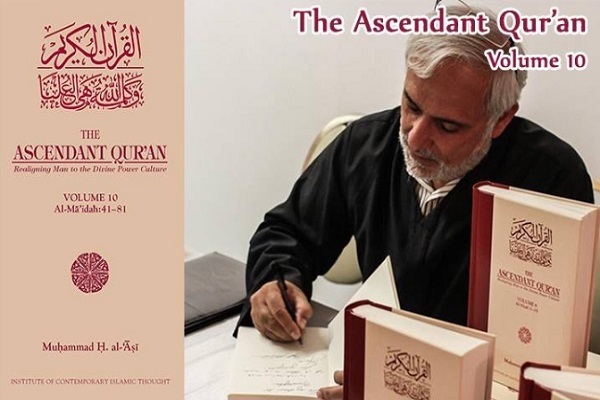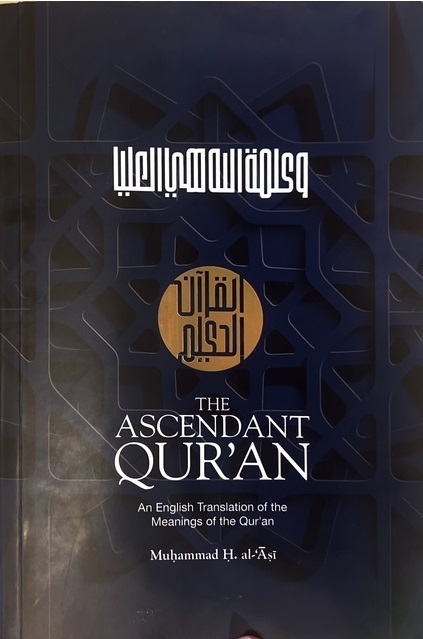A Look at Muhammad al-Asi’s English Translation of Quran

Sheam Abdul Aziz Khan, a Cardiff University professor, has taken a look at the work in an article, excerpts of which are as follows:
Although Muhammad al-Asi’s translation, The Ascendant Quran: An English Translation of the Meanings of the Quran, is relatively new on the translation scene, having been published only in late 2023, some iteration of its previous incarnation, as a constitutive element of al-Asi’s tafsir (also published under the name The Ascendant Quran) has been around since 2008, when the first volume was published.
Al-Asi introduces his exegetical work as the first to be written directly in the English language, as well as the first to reinterpret the Quranic text with the aim of serving the ‘needs of Muslims living in the modern world, and particularly for those active in the contemporary Islamic movement’.
In his preface, al-Asi concedes that his exegesis is not what one would expect from a standard tafsir, and that he prefers to frame it as ‘an analysis of the meanings of the Quran’. Although this may sound like the standard genre definition of tafsir, it appears to mean something else to al-Asi. He explains that his ‘analysis’ features twentieth-century personalities; these range from journalists who covered the first Persian Gulf War such as Judith Miller and Steven Emerson to more well-known politicians and monarchs, who are mentioned by name throughout. He maintains that although the Quran was revealed fourteen centuries ago, before these particular personalities existed, nonetheless, it helps the reader ‘identify the war criminals and financial criminals’, drawing attention to their characteristics and actions.
Al-Asi’s tafsir bears a similar title to his translation: The Ascendant Quran – Realigning Man to the Divine Power Culture. The first volume of this covered the first juzʾ (Surah Al-Fatiha and Surah Al-Baqara, up to verse 141), and subsequent volumes were released once or twice every year, each covering a smaller portion of the Quran than its predecessor but in more depth. The fourteenth and final volume, which was released in 2019, only covers the second half of Surah Al-Araf, the seventh Surah, despite still being over 400 pages long.
Thus, the published tafsir currently incorporates just under nine Juzes of the Quran, and no further volumes have been announced for release, despite al-Asi mentioning that he has already penned the next fourteen volumes, which will mean that he has covered roughly half the Quran in total. The publishers hint that their decision to abandon the project was mostly due to a belated realization that few readers are likely to purchase a treatise of around sixty volumes, which is how long it was projected to be had it continued in the same vein. They decided instead to redirect al-Asi’s efforts to publishing a simple stand-alone translation.
Zafar Bangash, the publisher of The Ascendant Quran translation, who is also director of the Institute of Contemporary Islamic Thought in Toronto (ICIT), insists that al-Asi’s translation is meant to serve as a companion to his tafsir compendium, and that it is aimed at non-Muslim readers or Muslims with only preliminary knowledge of the Quran. The wording of the stand-alone translation, however, is not the same as the target text previously presented in the tafsir that it is meant to accompany, which can at times cause the reader confusion, especially if it is read as an accompanying work, as suggested.

In his preface to the 2023 paperback edition, al-Asi describes his translation as a ‘Liberation Translation’, with its main aim being to recapture the ‘devotion-cum-social justice aspect’ which he sees to be the essence of all divinely revealed scriptures. Al-Asi and his team of editors at ICIT are also vocal proponents for decolonizing Quranic studies and, surprisingly for Quran translators, they bemoan the need for the Quran to be translated into ‘technocratic languages such as English which have matured within a techno-agnostic framework that has separated church from state and morality from legality’.
Read More:
However, they concede that, with English being the lingua franca of the world, translations into English remain necessary despite being imperfect vehicles through which to convey the divine message. When asked the inevitable but dreaded question that all Quran translators seem to be asked these days, ‘Why another translation?’, al-Asi responds with a line about making the translation more contemporary and more comprehensible.
The Translator’s Background
Muhammad al-Asi, is a US citizen who was born in Michigan in 1951, and is an Air Force veteran. He is a native speaker of both English and Arabic, having spent his formative years in the United States whilst graduating with a degree in Arabic Literature from the Arab University of Beirut, as well as earning a BA in Government and Politics from the University of Michigan. His degree choices presaged the interests that would come to dominate the next four decades of his life: Quran commentary and Arab-American politics.
Translation Approach
Al-Asi cites a number of exegetical references from both Sunni and Shia authors, however in interviews, the exegetes he most frequently mentions are Ibn Ashur, Allameh Tabatabaei, Sayyid Qutb, Muhammad Abduh, Rashid Rida, and Hussayn Fadlallah. The latter’s thematic emphasis on social justice seems to provide particular inspiration for al-Asi’s own thematic focus. Fadlallah, a Shia scholar from Lebanon, writes in the preface to his twenty-five volume exegesis, Min waḥy al-Quran, that his tafsir was compiled primarily for the purpose of awakening the spirit of the Islamic ummah, and he frequently references the build-up to the Islamic Revolution in Iran as a model for other Muslim nations.
Source: gloqur.de



